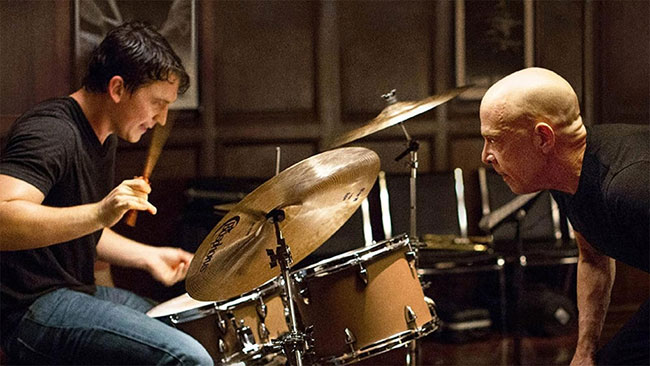
Miles Teller and J.K. Simmons appear in the 2014 film Whiplash.
Whiplash (Sony Pictures Classics)
Genre: Psychological drama
Streaming service: Amazon Prime
Rating: R (Strong language, some sexual references)
Summary: Andrew Neyman (Miles Teller) is an aspiring jazz drummer lucky enough to be accepted into a prestigious music conservatory. There he meets an ambitious instructor, Terence Fletcher (J.K. Simmons) who uses whip-like tactics to try and hone the young musician’s talent.
Synopsis: This Oscar-winning independent film from 2014 recently became available to stream on Amazon Prime. What could be a cautionary tale of the dangers of abusive coaching strategies leaves the audience wondering if Fletcher is a monster or a genius.
If Neyman had crumbled under the pressure, Fletcher would most certainly have been seen as a monster. Instead, Neyman rises to the challenge and achieves his goals. For better or worse, productivity and achievement are very important in American society. This film forces us to consider whether the ends justify the means.
After watching the film, I thought of former U.S. women’s gymnastics coach Bela Karolyi and the “Magnificent Seven.” When Kerri Strug performed a near-perfect final vault on a severely injured ankle during the team event in the 1996 Atlanta Olympic Games, she became an instant sensation and a hero. Karolyi, too, was seen as a hero for not allowing her to give up.
In recent years, the intimidating coaching tactics of Bela and his wife Marta have come to light. Attorney and former gymnast Rachel Denhollander alleges that Strug never had a choice in performing the career-ending vault that defined her.
Still, Strug believes the Karolyis were essential to her success. “Maybe it can be done another way, but they produce one champion after another after another,” she told the Houston Chronicle in 2008. “To get there, it will take things that aren’t necessarily pleasant. If it had it to do over, I would do the same thing.”
Strug achieved success and appears to be a well-adjusted adult, but we’ve all heard stories of young prodigies who were pushed to the max by their mentors and later developed depression, anxiety, Post-Traumatic Stress Disorder, eating disorders, drug addictions or other challenges.
A person may achieve their goals and still feel lost and unfulfilled if reduced to their accomplishments. Strug’s Atlanta teammate, Dominique Moceanu, claims that the Karolyis created a toxic environment that made training under them difficult and left her with issues that took years to sort out. She wrote about these dark experiences in her book, “Off Balance.” In Whiplash, one of Fletcher’s former students commits suicide.
How far is too far in pushing someone forward on the path of success? Ultimately, it’s a question of respect. St. John Paul II wrote about the value of hard work in his 1981 encyclical, Laborem Exercens. “But the Church considers it her task always to call attention to the dignity and rights of those who work, to condemn situations in which that dignity and those rights are violated.”
The dignity and rights of young prodigies — particularly athletes — have become a major topic of conversation in the nine years since Whiplash came out. During the Tokyo Olympics in 2021, champion gymnast Simone Biles pulled out of several events after suffering from “the twisties.” In doing so, she prioritized her physical and mental health over the possibility of adding to her impressive medal haul. Some called her weak, saying she should have pushed through like Strug. However, Biles’ coaches and mentors respected her dignity and right to bodily autonomy, empowering her to make the decision she felt was best.
Fletcher only respects Neyman’s potential to be a great musician. Neyman adapts this mindset and sacrifices his family, friends and health as a result. His success comes at a great price. When we reduce people to their abilities only, it strips them of their dignity. Mentors must step up by encouraging hard work while prioritizing the dignity of those who look to them for guidance.
Discussion questions:
How did Fletcher’s expression at the end of the film make you feel?
Do you think Neyman could have achieved greatness with a more compassionate teacher?
How do you believe coaches, teachers and mentors can create a nurturing environment that encourages hard work while emphasizing dignity?
(Editor’s note: Lindsay Steele is a reporter for The Catholic Messenger. Contact her at steele@davenportdiocese.org)











